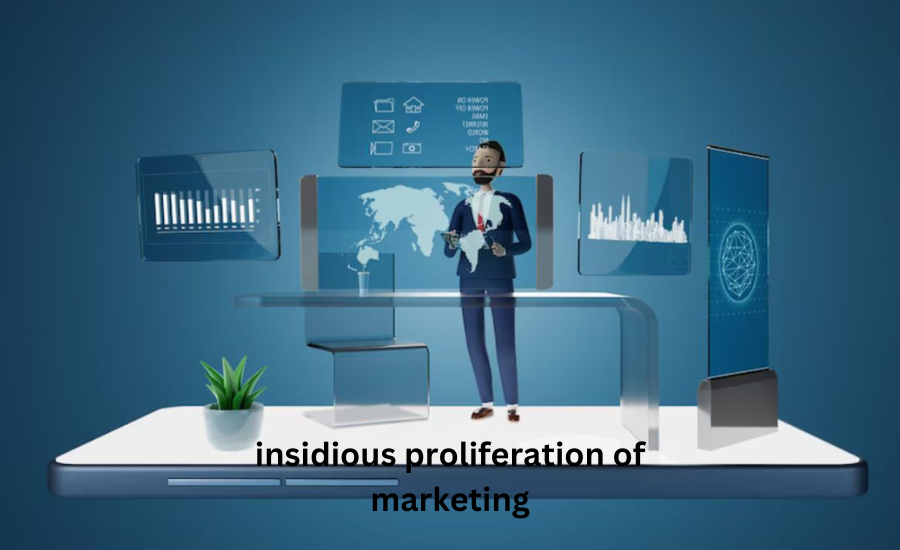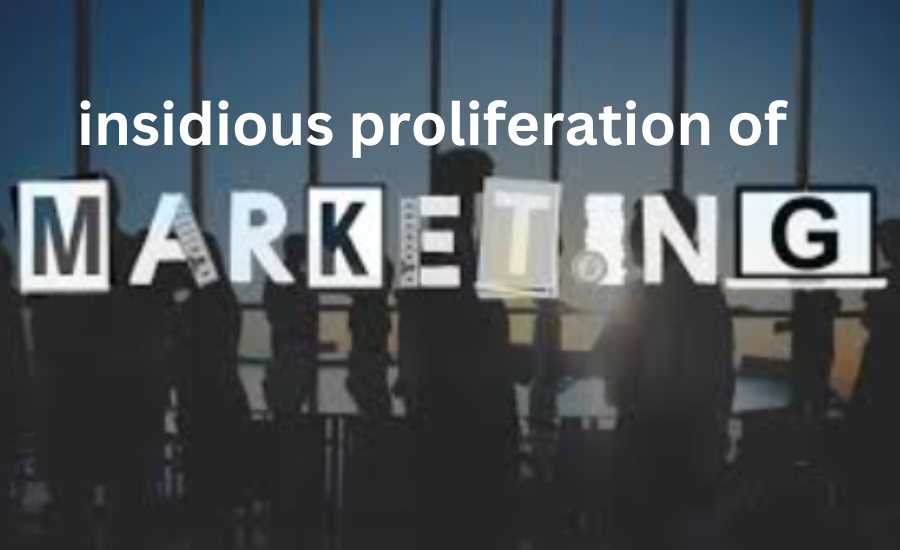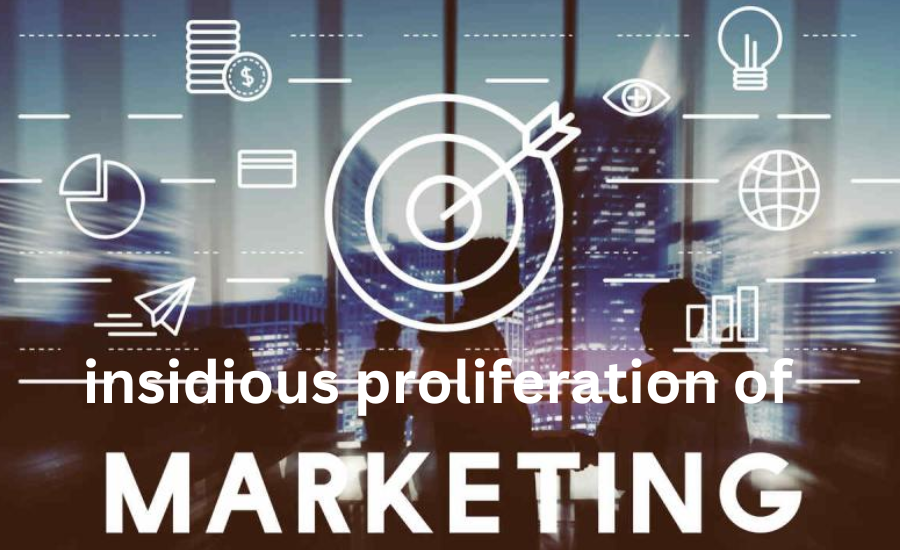The term “insidious proliferation of marketing” refers to the subtle and pervasive expansion of marketing efforts that infiltrate various aspects of daily life. Unlike traditional advertising, which is often overt and easily recognizable, this phenomenon involves a more covert integration of marketing strategies into everyday experiences. Marketing has long been a crucial element in achieving business success, effectively connecting companies with potential customers. Recently, however, the scope and intensity of marketing efforts have seen a significant surge. This trend, often termed the “Insidious Proliferation of Marketing” has transformed the advertising landscape, inundating consumers with messages and promotions at almost every juncture. From covert product placements in films to highly personalized ads on social media platforms, marketing has become intricately embedded in everyday life. What are the broader societal implications of this widespread influence? Let’s explore the intricate dynamics of this growing phenomenon and its far-reaching effects on our lives.
The Pervasiveness of Marketing in Modern Life
Marketing has evolved far beyond its traditional realms such as television commercials and billboards. It now infiltrates nearly every moment of our daily lives, starting with the first glance at our phones in the morning and extending throughout our day. Social media, in particular, has become a formidable platform for marketers, offering the ability to serve highly personalized advertisements tailored to our online behaviors, preferences, and even our conversations. This continuous bombardment of marketing messages has seamlessly integrated advertising into our daily routines, making it increasingly difficult to avoid its impact.

Influences on Consumer Behavior
The widespread expansion of marketing has significantly altered consumer behavior. The emergence of influencer marketing, coupled with advanced data analysis techniques, enables brands to deliver deeply engaging messages that resonate on a personal level. As a result, purchasing decisions are increasingly influenced by emotional responses and perceived social value rather than purely logical evaluation. The subtlety of these marketing strategies often blurs the line between genuine content and promotional material, making it challenging for consumers to discern when they are being swayed by marketing tactics. This evolution has led to a more complex landscape where the influence of advertising is often felt on a more profound and subconscious level.
Ethical Considerations and the Influence on Consumer Decision-Making
The extensive reach of modern marketing raises important ethical questions regarding its impact on consumer autonomy. As marketing strategies become increasingly sophisticated, utilizing psychological insights to influence behavior, concerns about the morality of these practices intensify. Are consumers genuinely exercising their free will, or are they being subtly guided by advertisements that exploit their psychological triggers? This issue is particularly pressing when evaluating the effects on vulnerable groups, such as children and individuals with limited digital literacy, who may be more susceptible to such manipulative tactics.
The Impact of Technology on Marketing Growth
Technology has been a driving force behind the rapid expansion of marketing strategies. The rise of big data, artificial intelligence, and machine learning has enabled marketers to collect and analyze vast amounts of consumer data, leading to the creation of highly targeted and personalized advertising campaigns. While these advancements can enhance the relevance of advertisements and potentially improve consumer experiences, they also pose significant privacy challenges. Many consumers are unaware of the full extent of data collection and usage, fostering feelings of discomfort and mistrust regarding how their personal information is handled. This dynamic underscores the need for greater transparency and ethical practices in the use of technology for marketing purposes.

Navigating the Future of Marketing Amidst Rising Consumer Resistance
As marketing strategies advance, consumers are increasingly pushing back against these methods, becoming more attuned to the tactics employed by advertisers. Tools like ad blockers, ad-free subscription models, and a growing demand for genuine, non-commercial content signal this resistance. Marketers, however, are not standing still; they are innovating by embedding their messages more subtly within the content people find engaging. This evolving landscape suggests that the future of marketing will involve an ongoing interplay between maintaining consumer autonomy and marketers’ persistent efforts to capture attention and drive sales. This balancing act will likely shape how marketing practices adapt and how consumers respond in the years to come.
Subtle Integration
The insidious nature of this proliferation lies in how marketing is integrated into content. Native advertising, for example, is designed to blend seamlessly with editorial content, making it difficult for consumers to distinguish between promotional material and genuine information. Similarly, influencer marketing often blurs the line between authentic endorsements and paid promotions. These tactics are crafted to appear natural and unobtrusive, subtly guiding consumer behavior without overtly drawing attention to their commercial intent.
Future Directions
Looking ahead, the challenge will be to balance the effectiveness of marketing strategies with ethical considerations and consumer rights. As technology continues to evolve, marketers will need to navigate the delicate line between innovation and manipulation. Consumers, on the other hand, will need to develop greater awareness and critical thinking skills to discern marketing tactics and make informed decisions.

FAQs
Q: What does the term “Insidious Proliferation of Marketing” refer to?
A: The term “insidious proliferation of marketing” refers to the subtle and pervasive expansion of marketing strategies that integrate deeply into various aspects of daily life. Unlike traditional advertising, which is often overt, this phenomenon involves marketing that is seamlessly woven into content, making it less noticeable but more influential.
Q: How has marketing evolved beyond traditional methods?
A: Marketing has expanded far beyond traditional channels like TV commercials and billboards. It now includes targeted ads on social media platforms, native advertising, influencer partnerships, and more. These modern methods embed marketing messages within the content that people engage with daily, such as social media posts, videos, and articles.
Q: What impact does this marketing evolution have on consumer behavior?
A: The evolution of marketing has significantly changed consumer behavior. Advanced data analysis and personalized advertising make messages more relevant and emotionally engaging. As a result, purchasing decisions are increasingly driven by emotional responses and perceived social value rather than purely rational considerations. This shift makes it harder for consumers to distinguish between genuine content and marketing messages.
Q: What ethical concerns are associated with modern marketing practices?
A: Modern marketing practices raise ethical concerns about the manipulation of consumer choice. As marketers use psychological insights and sophisticated techniques to influence behavior, questions arise about whether consumers are making free choices or being subtly manipulated. This concern is heightened when targeting vulnerable populations, such as children or individuals with limited digital literacy.
Q: How does technology influence the growth of marketing strategies?
A: Technology, including big data, artificial intelligence, and machine learning, has revolutionized marketing by enabling the collection and analysis of extensive consumer data. This enables the creation of highly specific and tailored advertisements. However, it also introduces privacy challenges, as many consumers are unaware of how their data is used, leading to discomfort and mistrust.
Q: How are consumers reacting to the increasing prevalence of marketing?
A: Consumers are responding to the increasing prevalence of marketing by using tools like ad blockers, opting for ad-free subscription services, and seeking more authentic content. This resistance reflects a growing awareness of marketing tactics and a desire for greater transparency and genuine engagement.
Q: What are the future directions for marketing?
A: The future of marketing will involve a balancing act between maintaining consumer autonomy and the relentless drive of marketers to capture attention. As technology continues to evolve, marketers will need to navigate the line between innovation and manipulation. Consumers will also need to develop greater awareness and critical thinking skills to understand and respond to marketing tactics effectively.
Conclusion
The “Insidious Proliferation of Marketing” refers to the subtle and widespread expansion of marketing strategies that now permeate various aspects of daily life, including social media, native content, and influencer endorsements. This shift has transformed consumer behavior, making decisions more influenced by emotional and social factors rather than rational analysis. Ethical concerns arise from the manipulation of consumer choices, particularly among vulnerable groups, while technological advancements enable more personalized advertising and raise privacy issues. As consumers respond with tools like ad blockers and a demand for authentic content, the future will likely see a nuanced balance between innovative marketing practices and consumer resistance, emphasizing the need for ethical marketing and informed consumer awareness.
Read Next: crema hidratante de aguaje en bolivia tesis



